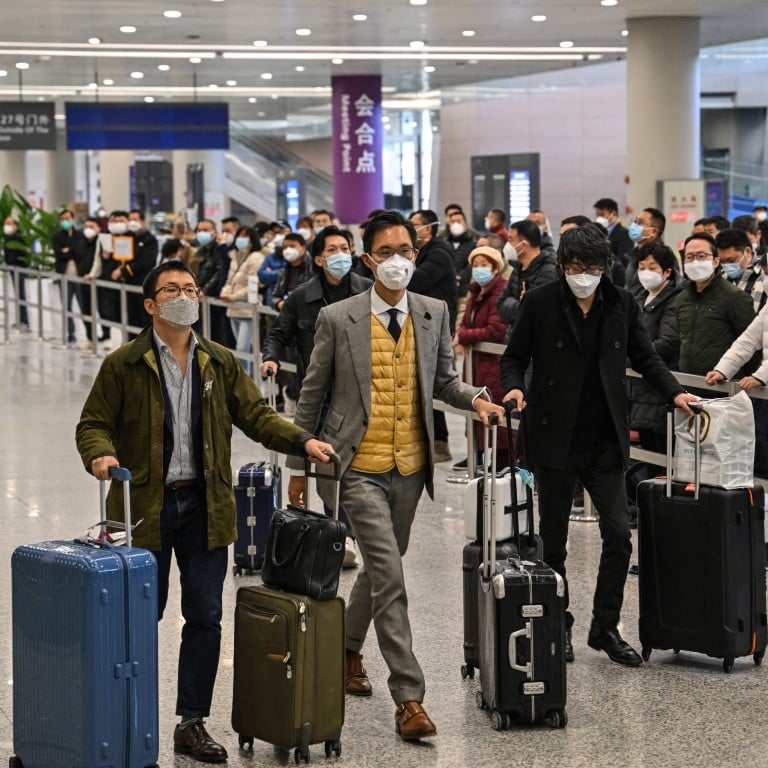
China’s airport ride-hailing ban, though brief, fuels fear of private sector grounding
- After ride-hailing services were temporarily banned at a Shanghai airport, analysts worry the move will dampen business and consumer confidence
- ‘Sweeping’ move shows regulatory action can be hard and swift, they said, and could put a damper on private sector activity
The Shanghai government’s controversial ban on ride-hailing services at one of China’s busiest airports only lasted a week, but that was enough to spark doubts over the country’s commitment to finding growth momentum in a slowing economy.
The Shanghai Road Administration Bureau announced on Sunday at midnight that pickup services booked through ride-hailing apps would resume at Pudong International Airport after a ban levied on January 29, adding the decision was made “after receiving feedback from the general public”.
The airport was the second-busiest in China last year in terms of visitor numbers, with only Guangzhou Baiyun International Airport hosting more traffic according to reports from airport operators.
The policy – announced ahead of the Lunar New Year holiday, a peak travel period – was met with an overwhelmingly negative public response. Critics described it as an act directly contradicting Beijing’s commitment to clear unnecessary restrictions of market access, crucial for the nation’s efforts to achieve a sustained recovery.
The State Council, China’s cabinet, said last Friday that the government should “align policy directions” and “build a transparent and predictable policy environment”, which would be helpful to lift confidence and counter downward risks.
These internet platform services have created massive economic growth potential, and consumers choose them over taxis for a reason
But the “sweeping approach” of some government departments when implementing certain policies remains a confounding factor, said a Beijing-based economics professor and specialist in consumer behaviour, who asked not to be named as they are not authorised to speak to the media.
“Taking a sudden and sweeping approach in this case is simply not right,” they said, adding that such actions would create uncertainty in the business environment and hinder consumer confidence.
“These internet platform services have created massive economic growth potential, and consumers choose them over taxis for a reason.”
More Chinese expected to travel abroad for Lunar New Year
A few days after the public outcry, the Shanghai transport authorities urged the public to “adopt a longer term perspective” for the city’s transport arrangement and said the decision was to avoid letting ride-hailing become a “monopoly” when there is enough supply in taxi services. The authorities added the arrangement would “ensure smooth and orderly traffic” at the airport.
Alicia Garcia-Herrero, an economist for the Asia-Pacific region at French investment bank Natixis, said ride-hailing drivers “should have equal rights” to compete with taxi drivers.
The latter group, she added, would definitely come out comparatively well in the initial ban, making taxi services the “monopoly” instead.
“If the government will abuse its power to protect the interests of the monopolist, options that have real potential to grow and are chosen by consumers may be forced out. This issue is essentially the same as the local protectionism mentioned during the reform of state-owned enterprises in the last decade,” Garcia-Herrero said.
Fu Weigang, executive president of the Shanghai Institute of Finance and Law, said the incident would impact business confidence.
“The business environment is what private and foreign enterprises are more concerned about these days,” Fu said.
“This incident [shows] the problematic sides in the environment that need to be improved, like making sure that a new regulation is well thought out before implementation to avoid shocks and that law enforcement is consistent and predictable.”
He did give some credit to authorities, however, calling the reversal of the policy “timely” and an act which showed public opinion was being taken into account.
Ride-hailing was China’s fastest-growing internet market segment in terms of user scale, according to a 2023 report by the China Internet Network Information Centre.
Regulatory scrutiny was largely treated as over last year, when Beijing began praising leading internet platforms as economic drivers and vowed to provide further support for the development of platform companies.
Both the Beijing-based professor and Garcia-Herrero said as the Chinese economy is in downturn, job opportunities at online ride-hailing and food delivery platforms have become important sources of income.
“We have been talking about the importance of boosting consumption in order to drive the economy in the past few years, and it is important to address the uncertainties in income and policies,” the Beijing-based professor said.
Additional reporting by Frank Chen




